Stay in the know on all smart updates of your favorite topics.
Moving from a linear to a circular economy means minimising the waste and pollution by reducing, recycling and reusing. The City of Amsterdam aims to redesign twenty product- or material chains. The implementation of material reuse strategies has the potential to create a value of €85 million per year within the construction sector and €150 million per year with more efficient organic residual streams. Amsterdam set up an innovation program on the circular economy; www.amsterdamsmartcity.com/circularamsterdam. By converting waste into electricity, urban heating and construction materials, the Amsterdam Electricity Company generates 900 kWh per 1000 kg of waste. 75% of the sewage system is separated for waste and rain water and the silt which remains after treating waste water is converted into natural gas. Share your innovative concepts and ideas on circular economy here.
Aan de slag met Digitale Transformatie: Data & AI Seminar

Wil je optimaal profiteren van data?
Ben jij volop bezig met datagedreven projecten? Wil je leren hoe je het maximale uit data kunt halen en hoe je de uitdagingen kunt tackelen? Dan mag je ons Data en AI Seminar op 30 januari absoluut niet missen. Dit event gaat verder dan enkel inspiratie; het biedt je concreet praktische tools om data effectief in te zetten. Onze experts delen waardevolle inzichten, best practices en direct toepasbare tips om jouw organisatie te laten excelleren in de datagedreven wereld.
Voor wie is dit event?
Ben jij de drijvende kracht achter digitale transformatie in jouw organisatie? Sta je voor grote veranderingen en zoek je praktische tools die direct inzetbaar zijn? Ons seminar op 30 januari 2024 is speciaal ontworpen voor managers en besluitvormers die willen excelleren in de wereld van AI, analytics en data. Ontdek hoe je deze krachten kunt inzetten voor een tastbare impact in jouw organisatie. Ook professionals die hun kennis willen vergroten op deze baanbrekende onderwerpen zijn van harte welkom. We bieden inzichten en praktische tools die jou een voorsprong geven.
Wat kun je verwachten?
Vier inspirerende sprekers nemen je mee in het succes van datagedreven werken. Ze delen waardevolle inzichten en praktische tips om je op weg te helpen. Dit evenement biedt ook uitstekende mogelijkheden om te netwerken en ervaringen uit te wisselen.
Programma en locatie
Het programma is samengesteld uit een openingssessie en drie sprekerssessies.
Natuurlijk sluiten we de dag gezamelijk af met een hapje en drankje.
Datum: 30 januari 2024
Locatie: Royal HaskoningDHV, Amersfoort (Laan 1914 35, 3818 EX)
Aanpak woningtekort: Begint met regievoering, verbinding en vereenvoudiging

De gevolgen van de woningnood manifesteren zich op vele manieren, van studenten en dertigers die nog bij hun ouders wonen tot mensen met een middeninkomen die tussen wal en schip raken, en dak- en thuislozen zonder nachtopvang. Onbetwistbaar is dat huisvestingsproblemen en het ontbreken van een stabiele woonsituatie grote sociaaleconomische gevolgen met zich meebrengen, waaronder impact op werk, gezondheid en onderwijs.
Het is dan ook niet verrassend dat het woord 'bestaanszekerheid' vaak voorkomt in diverse verkiezingsprogramma's. Het vraagstuk is urgenter en nijpender dan ooit. Er is een behoefte aan 900.000 woningen vóór 2030 vastgesteld. Daarnaast stijgt het huidige woningtekort dit jaar van 3,9 procent naar 4,8 procent, grotendeels als gevolg van toenemende migratie, ouderen die langer thuis blijven wonen en het feit dat er steeds minder mensen samen in een huis wonen.
Hoe pakken we het woningtekort aan?
In reactie op het oplopende woningtekort zei demissionair minister Hugo de Jonge (Volkshuisvesting en Ruimtelijke Ordening): “We moeten met meer tempo en meer regie, meer betaalbare huizen gaan bouwen.” Maar: hoe doe je dat in zo'n complex krachtenveld?
Lennert Middelkoop en Gijsbert Duijzer leiden het Deloitte Real Estate team dat zich bezighoudt met alles rondom woningbouw. Momenteel werken ze in opdracht van het ministerie van BZK onder meer aan het versnellen van de realisatie van tijdelijke huisvesting.
Middelkoop: “Dat is ontstaan vanuit het idee dat we, naast analyses en diepgravend onderzoek, vooral de noodzaak zagen om te helpen bij het tekort aan realisatiekracht.”Duijzer: “We staan nu met onze voeten in de klei en zijn inmiddels betrokken bij zo'n 230 woningbouwprojecten door heel Nederland. We helpen onder meer woningcorporaties, bouwers, gemeentes, provincies, nutspartijen, en kijken wat er nodig is om de projecten van de grond te krijgen en richting realisatie te brengen. We spreken iedereen, werken met alle partijen samen, en maken op die manier verschil.”
Knelpunten
Duijzer en Middelkoop benadrukken dat het een complex vraagstuk is. Ze zien vier belangrijke knelpunten die de realisatie van huisvesting bemoeilijken. Draagvlak en locaties is een eerste punt. Middelkoop: “We merken dat er op bestuurlijk, politiek en maatschappelijk niveau vaak discussie en terughoudendheid is om bepaalde locaties toe te wijzen aan aandachtsgroepen, zoals arbeidsmigranten.” Duijzer: “Ruimte is schaars en er is altijd wel een reden te bedenken waarom er iets anders op een bepaalde plek moeten komen. Zeker als het gaat om mensen die momenteel niet tot de gemeenschap behoren van een bepaalde gemeente.”
Een tweede knelpunt is de business case die, zowel voor tijdelijke als reguliere huisvesting, op dit moment vaak niet rond te krijgen is. Duijzer: “Oorzaken zijn onder meer de stijgende rente en de hoge grond- en bouwkosten, waardoor de kosten van woningen te veel stijgen. Tegelijkertijd kun je de huurprijzen in de sociale huursector nauwelijks verhogen. Bovendien worden locaties nu vaak tijdelijk vergund voor een periode van maximaal 15 jaar, wat onduidelijkheid schept over de toekomst van deze woningen. Dit resulteert in een negatieve business case.”
Ruimtelijke ordening is een derde knelpunt. Duijzer: “De regelgeving rondom ruimtelijke ordening was al ingewikkeld, en de nieuwe omgevingswet zal bij veel gemeenten waarschijnlijk eerst vooral tot onzekerheid en vertraging leiden.” Middelkoop: “Iedereen heeft het recht er iets van te vinden, en er spelen vaak veel belangen. Denk bijvoorbeeld aan de regels voor bezwaar en beroep of de flora- en faunawet. Het is belangrijk dat we regelgeving hebben voor dit soort zaken, het gaat immers over belangrijke thema's als leefbaarheid en duurzaamheid, maar op dit moment ontbreekt een integrale uitvoering.”
Het laatste knelpunt is nutsvoorzieningen. Duijzer: “In veel delen van het land is er netcongestie en een tekort aan materialen en personeel bij netbeheerders, wat leidt tot lange wachttijden voor elektriciteitsaansluitingen.”
Het laatste knelpunt is nutsvoorzieningen.
Duijzer: “In veel delen van het land is er netcongestie en een tekort aan
materialen en personeel bij netbeheerders, wat leidt tot lange wachttijden voor
elektriciteitsaansluitingen.”
"Om verschil te maken als overheid, moet je een uitvoerende regie pakken."
Actieve betrokkenheid bij projecten
De grote vraag is hoe je binnen dit krachtenveld laveert en vooral wat dan wel werkt in de aanpak van het woningtekort. Als je als overheid verschil wilt maken, moet je een uitvoerende regie pakken, stellen Duijzer en Middelkoop. “Sturen door actief betrokken te zijn bij projecten”, zegt Duijzer. “Alleen op die manier kun je eigenaar worden van het probleem en echt snappen wat er in praktijk speelt. Actieve betrokkenheid legitimeert bovendien het beleid en helpt om de echte knelpunten te identificeren. Dat heeft tot gevolg dat je beleid en interventies kunt ontwikkelen die echt iets oplossen.”
Middelkoop: “Regie vanuit de Rijksoverheid is nodig. Als het gaat om draagvlak en locaties is het een illusie om te denken dat gemeenten daar alleen doorbraken zullen forceren. Daar ligt een taak voor de hele overheid.”
Duijzer: “De overheid moet locaties aanwijzen, maar dat moet wel hand in hand gaan met de uitvoering. Als je als Rijksoverheid actief en constructief betrokken bent bij de realisatie van woningbouwprojecten, en op basis daarvan locaties aanwijst, is dat veel effectiever en zal dat meer geaccepteerd worden dan wanneer je op afstand beleid formuleert.”
Middelkoop: “Een bindend beleidskader dat aanwijzen mogelijk maakt, heeft bovendien tot gevolg dat het voorspelbaar wordt waar in Nederland voor welke ruimtelijke invulling gekozen wordt. Daar is veel behoefte aan, ook bij professionele partijen die nu vaak moeten anticiperen op vele mogelijkheden en dan terugdeinzen voor grote investeringen zoals een robotlijn in een woningfabriek.”
Problemen vereenvoudigen
Volgens Duijzer en Middelkoop is er naast sturing en betrokkenheid bij de uitvoering van projecten nog een belangrijke rol weggelegd voor de Rijksoverheid: het verminderen van complexiteit. Middelkoop: “Bij de 230 projecten waar we bij betrokken zijn, zijn we continu bezig met het aanpakken van alle beren op de weg. We nemen elk probleem afzonderlijk ter hand en proberen het op te lossen."
"Ga in de bouwkeet of bij het projectteam zitten en vraag: wat hebben jullie nodig om een woning sneller neer te zetten?"
Duijzer: “Projecten lopen vaak vast door een overvloed aan uitdagingen. Het werkt echt om deze één voor één te lijf te gaan. Daarbij is het wel van belang dat alle partijen samenkomen, lef tonen en bereid zijn om concessies te doen.”Middelkoop: “Naast het geven van richting en het begrijpen van de lokale situatie, is het eveneens de taak van de Rijksoverheid om alle relevante partijen bijeen te brengen om samen te zoeken naar oplossingen. Het klinkt zo simpel, maar we merken vaak dat mensen soms jaren over elkaar kunnen praten, terwijl ze elkaar amper kennen.”
Het is verre van makkelijk om Nederland op een goede manier in te richten als het gaat om woningbouw. Middelkoop en Duijzer zeggen daarom: draai het om. Als het zo complex is op een plek, ga dan naar die plek toe om te praten met de betrokken partijen. Middelkoop: “Voer regie, zodat de uitvoering daar baat bij heeft, en niet andersom. Geef bindend richting en help waar nodig. Ga in de bouwkeet of bij het projectteam zitten en vraag: wat hebben jullie nodig om een bepaald type woning sneller neer te zetten? En pas dáár vervolgens je randvoorwaarden, beleid en regie op aan.”
Duijzer: “Regie en uitvoering zijn niet los van elkaar te zien. Als je draagvlak wilt creëren voor die regierol, hoort uitvoering daar altijd bij. Durf je te verhouden tot individuele projecten en ga ermee aan de slag. De rest volgt vanzelf. Na een bezoek aan een bouwkeet, gemeentehuis, woningcorporatie of participatieavond, ga je altijd naar huis met het idee: het kan anders, simpeler, en minder complex.”
Community meet up - resultaten van de donut dag
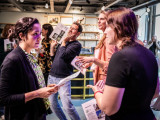
Op 13 november hadden we de eerste wereldwijde donut dag en ook in Amsterdam was het weer een waar feest. Nu is het natuurlijk belangrijk om die energie vast te houden! Daarom organiseren we op donderdag 14 december een community meetup waar de goede gesprekken die tijdens het donut festival weer kunnen worden voortgezet.
Geen zorgen, aanwezigheid bij het festival is geen vereiste. Kon je er niet bij zijn? Dan is dit een mooi moment om weer aan te sluiten!
In aanloop naar de meetup gaan we alle mooie resultaten van de Amsterdam Donut Dag verwerken en dan horen jullie meer van ons voor de planning van deze community meet up.
Schrijf je hier in voor de sessie.
Dan ontvang je ongeveer een week voor het community meet up een zoom link.
Tot dan!
A new challenge: Floating neighbourhoods with AMS Institute and municipality of Amsterdam
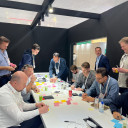
A lot of what we did in Barcelona was about making connections, sharing knowledge, and being inspired. However, we wouldn’t be Amsterdam Smart City if we didn’t give it a bit of our own special flavour. That’s why we decided to take this inspiring opportunity to start a new challenge about floating neighbourhoods together with Anja Reimann (municipality of Amsterdam) and Joke Dufourmont (AMS Institute). The session was hosted at the Microsoft Pavilion.
We are facing many problems right now in the Netherlands. With climate change, flooding and drought are both becoming big problems. We have a big housing shortage and net congestion is becoming a more prominent problem every day. This drove the municipality of Amsterdam and AMS institute to think outside the box when it came to building a new neighbourhood and looking towards all the space we have on the water. Floating neighbourhoods might be the neighbourhoods of the future. In this session, we dived into the challenges and opportunities that this type of neighbourhood can bring.
The session was split up into two parts. The first part was with municipalities and governmental organisations to discuss what a floating neighbourhood would look like. The second part was with entrepreneurs who specialized in mobility to discuss what mobility on and around a floating neighbourhood should look like.
Part one - What should a floating neighbourhood look like?
In this part of the session, we discussed what a floating district should look like:
- What will we do there?
- What will we need there?
- How will we get there?
We discussed by having all the contestants place their answers to these questions on post-its and putting them under the questions. We voted on the post-its to decide what points we found most important.
A few of the answers were:
- One of the key reasons for a person to live in a floating neighbourhood would be to live closer to nature. Making sure that the neighbourhood is in balance with nature is therefore very important.
- We will need space for nature (insects included), modular buildings, and space for living (not just sleeping and working). There need to be recreational spaces, sports fields, theatres and more.
- To get there we would need good infrastructure. If we make a bridge to this neighbourhood should cars be allowed? Or would we prefer foot and bicycle traffic, and, of course, boats? In this group, a carless neighbourhood had the preference, with public boat transfer to travel larger distances.
Part two - How might we organise the mobility system of a floating district?
In the second part of this session, we had a market consultation with mobility experts. We discussed how to organise the mobility system of a floating neighbourhood:
- What are the necessary solutions for achieving this? What are opportunities that are not possible on land and what are the boundaries of what’s possible?
- Which competencies are necessary to achieve this and who has them (which companies)?
- How would we collaborate to achieve this? Is an innovation partnership suitable as a method to work together instead of a public tender? Would you be willing to work with other companies? What business model would work best to collaborate?
We again discussed these questions using the post-it method. After a few minutes of intense writing and putting up post-its we were ready to discuss. There a lot of points so here are only a few of the high lights:
Solutions:
- Local energy: wind, solar, and water energy. There are a lot of opportunities for local energy production on the water because it is often windy, you can generate energy from the water itself, and solar energy is available as well. Battery storage systems are crucial for this.
- Autonomous boats such as the roboat. These can be used for city logistics (parcels) for instance.
- Wireless charging for autonomous ferry’s.
Competencies:
- It should be a pleasant and social place to live in.
- Data needs to be optimized for good city logistics. Shared mobility is a must.
- GPS signal doesn’t work well on water. A solution must be found for this.
- There needs to be a system in place for safety. How would a fire department function on water for instance?
Collaboration:
- Grid operators should be involved. What would the electricity net look like for a floating neighbourhood?
- How do you work together with the mainland? Would you need the mainland or can a floating neighbourhood be self-sufficient?
- We should continue working on this problem on a demo day from Amsterdam Smart City!
A lot more interesting points were raised, and if you are interested in this topic, please reach out to us and get involved. We will continue the conversation around floating neighbourhoods in 2024.
Ontdek de kansen van robotica

ONTDEK DE KRACHT VAN ROBOTICA IN DE MAAKINDUSTRIE
Robots zijn niet langer de toekomst; ze zijn het nieuwe normaal. Het is tijd voor je bedrijf om de mogelijkheden te verkennen. Als je binnen de maakindustrie werkt en wilt begrijpen hoe robotisering je bedrijf naar een nieuwe hoogte kan tillen, dan zijn deze workshops de oplossing voor jou!
Binnen enkele weken kun jij je al verdiepen in de wereld van robots. Onze inspiratie workshops robotics bieden je de kans om drie middagen lang met ons aan de slag te gaan. Samen gaan we ontdekken waar de uitdagingen en mogelijkheden voor jouw bedrijf op het gebied van robotisering liggen. We laten zien hoe je jouw bedrijf toekomstbestendig kunt maken.
Wat leer je?
In drie middagen ontdek je de wereld van robotica en ga je aan de slag met een concreet plan voor de toepassing van robotica in jouw bedrijf. We laten je zien hoe robotica jouw bedrijf efficiënter kan maken. Niet in plaats van, maar samen met jouw collega’s.
Voor wie?
De workshop is geschikt voor iedereen die in de maakindustrie werkt. Bijvoorbeeld voor projectleiders en werkvoorbereiders.
Wanneer en waar?
De workshop bestaat uit drie sessies of “stations”, verspreid over drie middagen van 14:00 – 17:00 uur:
- De mogelijkheden van robotica – 6 december 2023
Een kennismaking met de wereld van robotica. Wat is jouw rol hierin? Hoe kan robotica jou ondersteunen in jouw werk? - Robotica in de praktijk – 17 januari 2024
We behandelen business cases uit de praktijk en kijken naar live demo’s van experts. Welke best practices zijn er? Wat zijn de mogelijkheden voor jou en jouw bedrijf? - De waarde van robotica - 28 februari 2024
Maak een business case onder begeleiding van experts. Samen met andere professionals werk je een business case uit voor jouw bedrijf. Aan het eind van middag pitch je jouw plan.
Wij begrijpen dat robotisering een grote stap kan zijn, maar de voordelen zijn aanzienlijk. Het is nu een uitgelezen moment om te onderzoeken hoe uw bedrijf waardevolle vooruitgang in de maakindustrie kan realiseren. Wacht niet langer om de kracht van robotica te omarmen!
AMS Conference: Final call for submissions & keynote speaker announcement

We're thrilled to share another round of exciting updates on the AMS Conference (April 23-24, 2024). As a quick reminder, the submission deadline has been extended to November 14th, providing you with an opportunity to be a contributor to this multi-dimensional event celebrating urban innovation and sustainability. Submit your abstract, workshop, or special session here 👉 https://reinventingthecity24.dryfta.com/call-for-abstracts
🎙️ Meet our keynote speaker: Charles Montgomery
We are honored to introduce Charles Montgomery, an award-winning author and urbanist, named one of the 100 most influential urbanists in the world by Planetizen magazine in 2023. Charles Montgomery leads transformative experiments, research, and interventions globally to enhance human well-being in cities.
His acclaimed book, Happy City, Transforming Our Lives Through Urban Design, explores the intersection between urban design and the emerging science of happiness. His presentation at the AMS Conference, "Your city should be a trust machine," delves into the critical role of trust in human happiness and societal success. As the world grapples with a trust deficit, Charles Montgomery shares insights drawn from over a decade of using lessons from behavioral science and psychology to turn cities into better social machines.
🚀 Don't miss your chance to contribute to the future of cities! For more details about submissions and to submit your abstract, workshop, and/or special session, visit our conference website 👉 https://reinventingthecity24.dryfta.com/call-for-abstracts
Kl Brouwerij #3: Klimaateerlijkheid

Kom op 29 november naar de KL Brouwerij, laat je inspireren door het theaterstuk ‘De zaak Shell’ en ontrafel samen met ons – midden in de buurt – de wirwar aan verantwoordelijkheden bij het aanpakken van de klimaatcrisis.
Een aantal keer per jaar organiseert Kennisland de KL Brouwerij. Dan laten we ons werk even voor wat het is en brouwen we samen nieuwe ideeën voor maatschappelijke uitdagingen. We brengen leven in de brouwerij door te ontdekken, smeden, broeden, fantaseren en borrelen. Dit doen we met partners, experts, ervaringsdeskundigen en betrokkenen bij het vraagstuk dat centraal staat, en waar we meer over willen leren. De derde KL Brouwerij staat in het teken van de klimaatrechtvaardige samenleving: hoe zorgen we ervoor dat iedereen op een eerlijke manier verantwoordelijkheid neemt in het aanpakken van de klimaatcrisis?
Hoe ziet een klimaatrechtvaardige samenleving eruit?
De klimaatcrisis is niet eerlijk. Rijke mensen, bedrijven en landen veroorzaken de meeste schade, terwijl vooral arme mensen de gevolgen voelen. Als we de klimaatcrisis willen stoppen, moeten we deze cirkel doorbreken. Maar wiens verantwoordelijkheid is dat eigenlijk en wie is er het eerst aan zet? De consument die zijn eigen klimaatvoetafdruk moet verkleinen? Vervuilende bedrijven die steeds meer winst maken en ondertussen profiteren van fossiele subsidies? Of de overheid die met wetten, regels en beleid belangrijke koerswijzigingen kan realiseren, maar dat te weinig doet? Tijdens deze KL Brouwerij ontrafelen we samen die wirwar. Dat doen we met theater, inspirerende buurtinitiatieven en vooral veel ruimte voor uitwisseling en gesprek.
De zaak Shell
We starten met live theater uit het prijswinnende stuk De zaak Shell. Regisseurs Anoek Nuyens en Rebekka de Wit bezochten Shells aandeelhoudersvergaderingen, ploegden door beleidsnota’s van de overheid en schreven mee met opmerkingen van familieleden aan het kerstdiner. In dit stuk komen alle stemmen in het klimaatdebat samen en zien we hoe elke partij de verantwoordelijkheid naar de ander doorschuift.
Klimaatrechtvaardigheid in de wijk
Na het theaterstuk brengen we dit gigantische onderwerp terug tot het niveau van de wijk. Hoe kunnen we ervoor zorgen dat de klimaatmaatregelen in wijken op een rechtvaardige manier vorm krijgen? We verhuizen voor deze editie van de KL Brouwerij naar buurthuis De Witte Boei, in het hart van de Oostelijke Eilanden, niet ver van het Marineterrein, midden in de buurt.
Kom ook en praat mee!
Deze KL Brouwerij vindt plaats op woensdag 29 november van 16.30-18.30 uur in buurthuis De Witte Boei op Kleine Wittenburgerstraat 201 in Amsterdam. Er is een beperkt aantal plaatsen, dus meld je snel aan via onderstaande link! Stuur voor vragen een mailtje naar Nina Sandford via ns@kl.nl.
Modular Construction
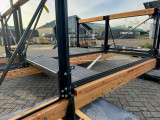
During this Meetup we will discuss how modular construction with wood and steel transforms traditional construction practices and opens new doors for efficiency, sustainability and creativity. The project team of the project “Modular and c
Circular Bridge Systems” will show the results of this project and would like to discuss the challenges that modular construction brings with it in the areas of creativity versus standardization, digitalization, circular materials and new business models.
Modular and industrial construction is an umbrella term for innovative construction methods that promote efficiency and sustainability. In modular construction, structures are built from prefabricated modules or components that are produced in a factory and then assembled on the construction site. This speeds up construction time and minimizes waste. Industrial construction focuses on advanced manufacturing technologies and standardized processes to improve quality and efficiency, while also offering flexibility in design. Both approaches contribute to cost savings, reduced environmental impact and faster project delivery in the construction sector.
The project team that will give the presentation consists of:
Thijs Asselbergs - Thijs Asselbergs Architectuurcentrale
Arjan Karssen - Bureau Arjan Karssen
Anke Rolvink - Packhunt
Jasper Dol - 3D Makers Zone (3DMZ)
Mark Feijen - Isaac
Chris Aerts - AplusV
Annette Beerepoot - BouwLab R&Do
16:00 - 18:00 | BouwLab - Oudeweg 91-96, Haarlem
Modular Construction
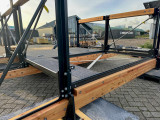
During this Meetup we will discuss how modular construction with wood and steel transforms traditional construction practices and opens new doors for efficiency, sustainability and creativity. The project team of the project “Modular and c
Circular Bridge Systems” will show the results of this project and would like to discuss the challenges that modular construction brings with it in the areas of creativity versus standardization, digitalization, circular materials and new business models.
Modular and industrial construction is an umbrella term for innovative construction methods that promote efficiency and sustainability. In modular construction, structures are built from prefabricated modules or components that are produced in a factory and then assembled on the construction site. This speeds up construction time and minimizes waste. Industrial construction focuses on advanced manufacturing technologies and standardized processes to improve quality and efficiency, while also offering flexibility in design. Both approaches contribute to cost savings, reduced environmental impact and faster project delivery in the construction sector.
The project team that will give the presentation consists of:
Thijs Asselbergs - Thijs Asselbergs Architectuurcentrale
Arjan Karssen - Bureau Arjan Karssen
Anke Rolvink - Packhunt
Jasper Dol - 3D Makers Zone (3DMZ)
Mark Feijen - Isaac
Chris Aerts - AplusV
Annette Beerepoot - BouwLab R&Do
Minecraft Almere Pampus Challenge: pushing the boundaries to build the city of the future

In today's dynamic landscape, the key to success lies in collaboration. The Green Innovation Hub firmly believe in the power of partnerships between companies, government and educational institutions to drive innovation, growth and positive change. In a world where technology connects us in unique ways, the Minecraft Almere Pampus Challenge exemplified the power of communities coming together to achieve remarkable feats.
It's inspiring to witness the incredible work of our young talents. They are the architects of the future and they're currently building virtual cities where companies can find their next digital solutions. Whether you represent a company, government department, or educational institution, we invite you to connect and explore how we can collaborate to make a meaningful impact on our shared goals.
1. Fresh Perspectives: young talent brings fresh and innovative perspectives to the table. They're unafraid to challenge the status quo and reimagine how things can be done.
2. Cutting-Edge Tech: these virtual cities are powered by the latest technologies from Microsoft and Iamprogrez. Companies can tap into this tech-savvy generation to incorporate cutting-edge solutions into their operations.
3. Collaboration Opportunities: collaborating with these digital pioneers can lead to mutually beneficial partnerships. Your company can gain a competitive edge while offering mentorship and growth opportunities to the next generation.
Find the Green Innovation Hub (NL Pavilion) at the Smart City Expo World Congres in Barcelona, and let's meet each other. Together, we'll keep pushing the boundaries of what's possible in the Minecraft universe and to build the house – or even the city of the future. Also stay tuned for upcoming advantures, events and challenges on our channels.
Watch the video: https://youtu.be/4F7CFGfb2HE
Demoday #21: Value Mapping practice with CIRCOLLAB
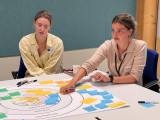
CIRCOLLAB, a network in the Metropolitan Region of Amsterdam aimed at accelerating the circular transition, is developing a method to apply systems thinking and eco-centric approaches in organisations. While developing the right workshop methods, they are hosting meet-ups to discover what it takes for organisations to look beyond their organisational boundaries and feel part of the larger system. In this worksession, our Demoday participants were invited to apply value chain- and systems thinking within a Almere Pampus case, and articulate their feedback on the workshop methods.
The case of Almere Pampus
The development of Pampus is a great example to use for experiments on circular value systems as there is a fresh clean sheet to start off with. Pampus can be used as a showcase and be a leading international example for sustainable area development by designing the area in a circular, climate-adaptive, nature-inclusive and energy-neutral way from the start, and by investing in necessary and smart above- and underground systems for energy, water, soil, food and waste early on. The two themes used during this exercise were the use of biobased building materials from hemp, and a transport system for local groceries.
Value Mapping
After an introduction by Melanie de Vries (Windesheim), Quirine Winkler (Windesheim) and Darina Huinck (HvA), the participants were split into two groups, each with their own Pampus Eiland topic. We were invited to make use of a ‘Value Mapping tool for sustainable business modelling (Bocken et al., 2012) to explore the value chain for our case. After the identification of the case its ‘purpose’, there were a few steps to walk through with the group and enrich the blank canvas:
- First of all, we identified some ‘values created’, in line with the purpose of the case. Think of; financial profits, healthier living conditions, sustainable building materials etc.
- Secondly, we identified all stakeholders concerned with the value chain. They could either be connected to the case because of their influence or because they’re affected by it. Think of; businesses, societal actors, nature, policy etc.
- Realizing the goal of the chain also has its negative side effects. Think of; the need for new knowledge and training, the abandonment of efficient production chains etc.
- The final two steps involved identifying the missed values and (the related) value opportunities. The group of stakeholders related to the value network could take on these value opportunities if they work together. For example; the need for new knowledge and training could create opportunities for new education business models, and; if the creating of new building materials requires more technical educated producers, they could be rewarded with discounts or financial help on housing in these newly created neighbourhoods.
- When all steps have been completed, you can actually look back at your input on the value map and make some adjustments if necessary. The initial purpose of the value chain for example, could be different now that all types of values and stakeholders have been identified.
Insights
Collaborating on an innovation case with the help of such methodology, made the participants aware of the complexities when considering a complete (eco)system. It emphasised the importance of considering the system and its stakeholders, and the variety of (surprising) ways in which value can be created within its network.
Identifying the ‘values destroyed’ and taking on the ‘value opportunities’ would be of importance in real-life scenarios. But who should be responsible for what? This made the group aware of the importance of independent- and network organizations to make networks and systems flourish.
During this exercise the groups were randomized. However, it became clear that each individual has their own expertise and interests and therefore has a personal perception or view of the system its analysing. The variety of values and stakeholders you could identify seem endless, and your personal perspective will determine what you focus on. It is therefore important to determine the composition of the group with which you will shape such a value map.
And last but not least, Melanie, Quirine and Darina received feedback on this workshop from the participants. They will use this feedback to further develop this method and workshop, before they invite regional parties to take part in their Learning Network Circular Collaboration.
Would you like to know more about CIRCOLLAB or their Systems / Value Mapping workshops? Get in contact with Melanie (m.h.devries@windesheim.nl) or CIRCOLLAB (circollab@hva.nl). Are you working at -or with- one of our partner organisations and would you like to organise a worksession at one of our Demodays? Get in touch with me! pelle@amsterdamsmartcity.com
6th Cassini Hackathon in Amersfoort

The CASSINI Hackathons take place simultaneously in 11 different countries. The 6th edition is scheduled for November 3-5, with events happening both in Amersfoort and online in the Netherlands. In Amersfoort, this exceptional event is co-organized by dotSPACE foundation and Royal Haskoning DHV.
The 6th edition of the hackathon revolves around three key themes:
- <strong>Supporting sustainable infrastructure development.</strong> A strong national infrastructure facilitates critical services, promotes opportunities, and stimulates economic growth. Can you create a solution that supports the development of renewable energy, transport and mobility, or connectivity infrastructure?
- Strengthening food security and access to clean water. Tackling the urgent global issues rooted in the scarcity of food and clean water, we’re challenging participants to explore how space technologies can be better prepared for humanitarian crises and more effectively manage precious resources.
- Understanding and forecasting forced migration. In this challenge, we’re looking for solutions that will help authorities to predict population movements from vulnerable areas. How can space data help us manage logistics, resources, and transportation during difficult times?
Who Can Participate?
The CASSINI Hackathon is open to students, entrepreneurs, engineers, designers, researchers, and anyone interested in space technologies, international development, and humanitarian activities. To participate, you must be 18 or older and reside in an EU Member State, Norway, Switzerland, or Iceland. Teams should consist of at least 3 members and can have a maximum of 8.
For your convenience, we’ve arranged accommodations for on-site participants at the Stayokay Hostel in Soest.
Demoday #21: Bringing Circularity to Small and Medium-Sized Businesses

Drawing by Govert van der Heijden from Flatland
The city of Amsterdam has ambitious circular goals, aiming to halve its resource usage by 2030. This corresponds to a yearly reduction in material use of the size of 15 Amsterdam Arenas. Collaboration amongst stakeholders, including small and medium-sized businesses (SMBs), is necessary to meet this target. In a work session, the focus was on engaging SMBs in the circular transition.
Ambitions and Strategy of the City of Amsterdam (Mariska Joustra):
The City of Amsterdam aims to reduce its use of new raw materials by 50% by 2023 and become fully circular by 2050. Using the Monitor Circular Economy, Amsterdam tracks its progress in the circular economy, enabling them to develop a strategy to achieve their ambitious objectives.
One of the key points of this strategy is to shift the focus from the city's organization to "Collaborating with the City" to better support entrepreneurs in the circular transition. Examples of how they try to achieve this are:
- Initiatives such as scaling up sustainable artificial turf fields through a significant procurement process.
- Using circular procurement as a means of encouraging companies to provide circular products.
- Mandating at least 20% of new construction to be timber-based.
- Offering a circular assessment to local manufacturers, allowing them to explore steps towards greater circularity.
“Rode Draden Raport” from the Versnellingshuis (Gabrielle Werkhoven):
The Versnellingshuis is an organisation that aids entrepreneurs in advancing circular business practices. Each year, they produce a Red Threads (Rode Draden) report that outlines the key issues in the circular economy. Their focus is on mobilizing the entire supply chain, which can be challenging. Process facilitators are vital for fostering circularity throughout the entire chain. Provinces like Noord-Holland and Zuid-Holland have lists of such facilitators to assist in making the entire chain more circular.
However, challenges persist, as the costs and benefits can vary significantly between different chain participants, making it difficult to implement systemic changes fairly.
Panel Discussion
Following the presentations, a discussion took place involving Jack Stuifbergen (MKB Nederland), Julius Heyning (Gekko), and Joanne Lucas (HvA), who represented the SMB sector. They highlighted the following key points regarding challenges and opportunities:
- Existing strategies, initiatives, and tools tend to benefit circular frontrunners within the SMB sector, often leaving the rest behind.
- Entrepreneurs often face legal obstacles in their sustainability efforts.
- Entrepreneurs need more financial incentives to transition to circular business models. The concept of "true price" could make a significant difference.
- Many entrepreneurs find it challenging to determine how to make their business more sustainable, particularly in sectors like software, where the environmental impact is not readily apparent.
- The Corporate Sustainability Reporting Directive (CSRD) offers significant opportunities for increasing circularity. It is crucial to ensure that SMBs are well-informed about the implications of this legislation.
Anne Schaap (MVO Nederland), Kornelis de Jong (municipality Haarlemmermeer), Gabrielle Werkhoven (Versnellingshuis), and Mariska Joustra (municipality of Amsterdam) discussed their efforts to support entrepreneurs:
- Simplifying the concept of circularity to emphasize resource savings and optimize logistics.
- Hosting events to educate SMBs about circularity, offering a platform for frontrunners in circularity.
- Collaborating with organisations like Triodos to assist entrepreneurs.
The consensus of the discussion was that more needs to be done to make circularity a pressing concern for the average SMB, their sense of urgency needs to be increased on this issue. More can be done for the front-runners as well because even though they receive considerable support, they still face legal and collaborative challenges.
This question was introduced in the Amsterdam Smart City network by Mariska Joustra from gemeente Amsterdam. The session was prepared with and moderated by Roos Kramer from Royal HaskoningDHV. Do you have any questions or input for us? Contact me via noor@amsterdamsmartcity.com or leave a comment below.
Kom 10 november naar de FoodCLIC visie workshop: Samen de route uitstippelen naar een gezonde, duurzame en toegankelijke voedselomgeving voor iedereen in de MRA.

FoodCLIC is een Europees onderzoeksproject waarin onderzoek gedaan wordt naar voedselsysteemtransformatie in stadsregio's. Het project richt zich op de plekken waar productie en consumptie samen komen, oftewel de voedselomgeving van de Metropool Regio Amsterdam. Voedsel Verbindt is als een van de praktijk partners aangesloten bij dit project en wilt daarom graag ook jouw stem vertegenwoordigd hebben binnen het onderzoek. Samen met de Vrije Universiteit, Food Council MRA en de Gemeente Amsterdam werken we samen om tot mooie inzichten te komen.
FoodCLIC kenmerkt zich doordat we ons bezig gaan houden met actie-onderzoek. In de vorm van real-life interventies. Voor verandering moeten we namelijk gewoon iets gaan doen, op zoek naar de oplossingen dus!
Datum en tijd:
vrijdag 10 november van 09.30 tot 16.30 (borrel tot 17.30 uur. )
Inclusief lokale lunch.
De locatie is:
Cultureel centrum NoLIMIT, Geldershoofd 80, 1103 BG, Amsterdam
Programma
09:30: Inloop & registratie
09:45: Start van de bijeenkomst
10:30: Workshop 1 - Regionale visie op de voedselomgeving in 2050
12:00: Voedseltours door de wijk
12:30: Pauze (Lunch) - Lokale voedselinitiatieven op je bord
13:30: Workshop 2 - Het voedselsysteem begrijpen
15:00: Pauze
15:30: Workshop 3 - Uitkomsten en doelstellingen formuleren
16:30: Borrel
Registreer jezelf via de onderstaande link:
Voel je vrij om contact op te nemen via ruben.smolders@voedselverbindt.nl
Harnessing Bio-Based Construction to Beat Carbon Budgets and Preserve Our Planet
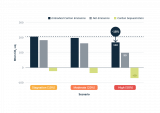
The construction sector is projected to exceed its carbon budget by 2026 using current construction practices.
But by constructing half of new residential buildings with bio-based materials, we can actually reduce CO2 emissions by 18% by 2030. That’s according to Metabolic's latest research, made possible through funding from Built by Nature. And if we consider carbon sequestration, we can even reduce the impact of the residential construction sector by 52%.
However, if solely focusing on carbon, we must be mindful not to shift the burden to other planetary boundaries. In our research, we discuss topics such as sustainable wood supply, climate change risks, and land use change. Based on our findings, we propose six steps to consider to realize a sustainable biobased construction sector.
Amsterdam Donut Dag
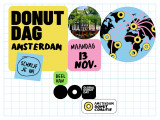
Groter dan ooit: Amsterdam Donut Dag 13 november - schrijf je nu in!**
De langverwachte Amsterdam Donut Dag staat bijna voor de deur! Op 13 november duiken we in de wereld van de Donut Economie en laten we zien hoe de gezamenlijke inspanning van pioniers Amsterdam tegen 2025 dichter bij de Donut brengt.
Dit jaar is extra bijzonder, want het markeert de allereerste Wereldwijde Donut Dag onder het motto 'Lokale Actie, Mondiale Connectie.' Wereldwijd organiseren meer dan 30 groepen en netwerken lokale Donut Festivals!
Verspreid over Amsterdam vinden op maandag 13 november in totaal 15 Donut-sessies plaats. Hier laten we samen zien dat de Donut Economie geen theoretisch model is, maar een praktische benadering. Verwacht geen vage beloftes, maar concrete voorbeelden van initiatieven binnen de stad, zowel groot als klein.
's Avonds komen we samen in Pakhuis de Zwijger om samen met pioniers en elkaar te dromen en te visualiseren hoe Amsterdam eruit zou kunnen zien in 2025. Mis deze geweldige kans niet! Ben jij erbij?
Live podcast-opname over afbouw: ‘Voer voor Verandering’

Dinsdag 7 november organiseert DRIFT in Theater Walhalla te Rotterdam haar allereerste interactieve podcast-avond over afbouw. Waar moeten we mee stoppen voor een beter Nederland? En hoe?
Wouter Mulders gaat in gesprek met stopstrateeg Marije van den Berg en aspirant-Minister van Afbraak Derk Loorbach. Stel je vragen live in de podcast en praat – zodra de microfoon weer uit is – onder het genot van een drankje na met andere transitiemakers. Koop hier je kaartje!
De DRIFT podcast ‘Voer voor verandering‘ gaat het vierde seizoen in. In dit nieuwe seizoen gaan we aan de slag met de vraag: als goede afbouw zo belangrijk is voor een groener en eerlijker Nederland, waarom zien we er dan zo weinig van? In vijf afleveringen, duiken we die vraag in door middel van muziek, verhalen en gesprekken met (oud-)burgemeesters, activisten, een rouw- en verliestherapeut en allerlei andere experts en ervaringsdeskundigen.
Omdat we meer willen doen dan alleen (uit)zenden, gaan we dinsdagavond 7 november een live podcast opnemen, waarin we het gesprek aan gaan met ons (luisteraars)netwerk over afbouw. Daar kun jij bij zijn!
Het programma ziet er als volgt:
- 18:30 – deuren open
- 19:00 – start van de avond met inleiding
- 19:45 – live opname met Wouter Mulders, Marije van den Berg en Derk Loorbach
- 20:30 – afsluiting
- 21:00 – napraten en gelegenheid tot drankje
De avond zal plaatsvinden in Theater Walhalla’s ‘Kleine Walhalla’, Sumatraweg 9-11 op Katendrecht in Rotterdam.
Kaartjes kosten € 12 en zijn te koop via deze link.
🍃 Join us for the next gathering of Climate Tech Amsterdam on October 17 at TNW City.

<strong>🍃 Join us for the next gathering of Climate Tech Amsterdam on October 17 at TNW City.</strong>
An initiative backed by leading ecosystem players, including TNW, StartupAmsterdam, Carbon Equity, Google Netherlands and supported by Climate Tech Cities and De Roos
💡 For this edition, we'll uncover the latest trends & developments in (Dutch) Climate Tech and facilitate discussions around e.g. Sustainable AI and Closing the Climate Finance Gap.
Climate Tech Amsterdam is the Netherlands’ leading community of climate tech innovators, experts and enthusiasts gathering during meetups, roundtables and events to exchange best practices, discuss challenges and opportunities and showcase success stories within Climate Tech.
Spots are limited, so make sure to register!
Vote your favourite innovative idea to the AmSIA stage!
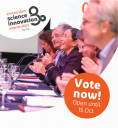
Which innovative idea will make it to the stage during the finale of the Amsterdam Science & Innovation Award 2023? This Innovation Award is the Amsterdam competition for research based innovative ideas that contribute to a better world. Check out the website and watch the pre-finalists one-minute videos in which they present their innovative ideas and vote for your favorite! During the finale on 21 November, the jury will award € 10,000 to the three best ideas in the categories of Society, Health and Environment & Climate.
Piss Soap Workshop at W139 (Amsterdam)

Dear Community,
This Saturday at w139 from 14:00-17:00 I will be facilitating a workshop on how to make your own soap with waste, including your golden biofluid.
Throughout the entire Piss Soap workshop, the basics of ecodeviance will be presented and exemplified throughout the process of saponification. We will review the possibility for local and tangible regenerative design, circular ecology and how to tackle the climate crisis while providing cleaning products. The workshop will present the full process of saponification and the steps required to transform domestic waste into usable soap. We will mix the various ingredients and create a circular process informed by waste management. The participants will have the opportunity to create intimate and personal outcomes from their own (bio) wastes. At the end of the workshop, everybody will come back home with 750g of soap to cure at home. After the 3 months needed to its complete maturation, the soap will be ready to be used for washing.
It is all free of charge, feel free to register by sending an email to piss.soaps@gmail.com
Stay up to date
Get notified about new updates, opportunities or events that match your interests.

